Teres major steak isn’t flashy, but it’s the kind of cut that makes you stop and take notice. I’m Edward Hale, born in Istanbul and raised in Texas. I learned to cook in busy kitchens and from family who treated food like a craft. My grandmother showed me how to pull big flavor from humble ingredients, and that stuck with me.
This steak? It’s one of those. Often overlooked, easy to miss, but once you try it, you’ll wonder where it’s been. It’s tender like filet, full of flavor, and forgiving to cook. Whether you’re firing up the grill or using a cast iron skillet, teres major gives you solid results every time.
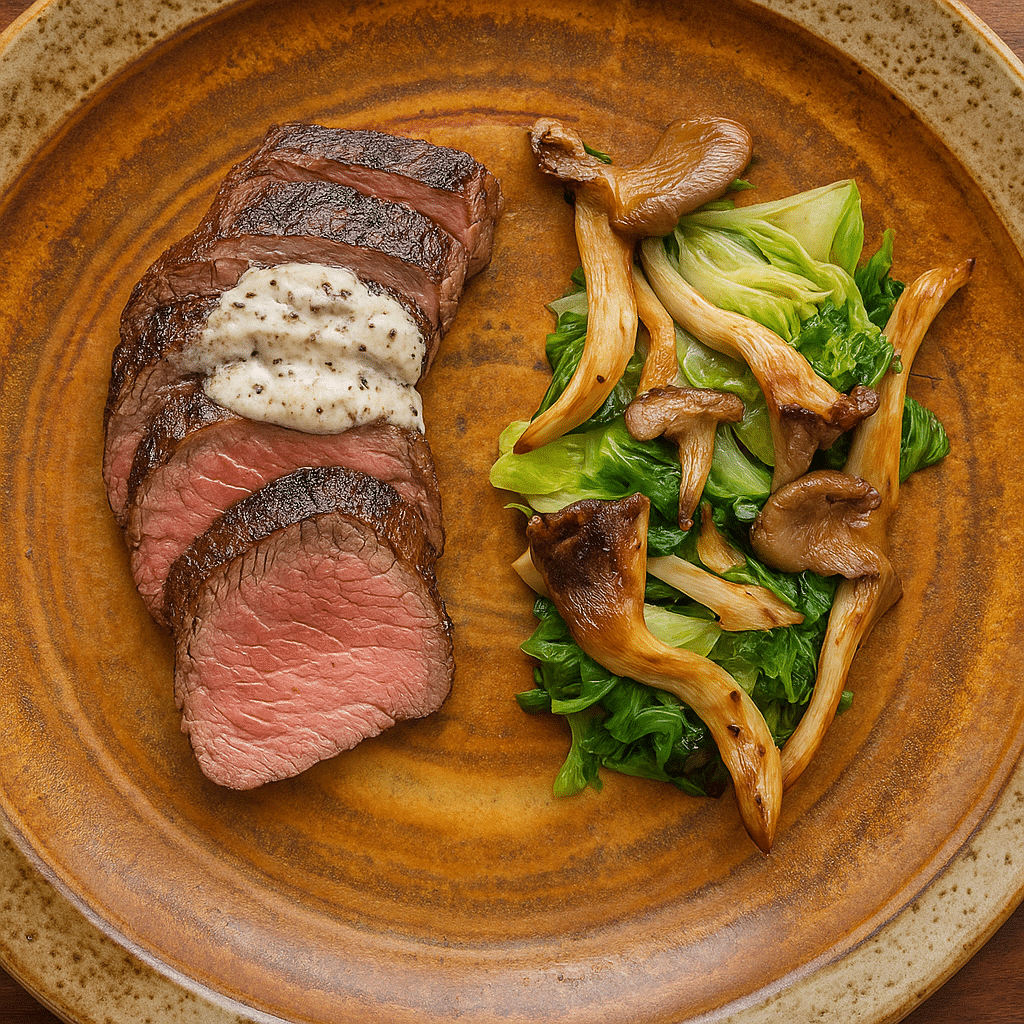
Table of Contents
Teres Major Steak: What It Is and Why It Deserves a Spot on Your Grill
A Steak With Quiet Confidence
Teres major steak comes from the shoulder. This flavorful cut is also known in some areas as oyster steak or shoulder tender, depending on local butchering terms. While the name might not sound exciting, the cut sure is. It’s naturally lean, fine-grained, and ranks high on the tenderness scale.
Because of where it sits on the cow, it sees just enough movement to build flavor, but not enough to get tough. That makes it special. Not too rich, not too chewy, just a balanced, flavorful steak.
Why It Belongs in Your Kitchen
This cut has been a go-to for cooks who know their beef. It’s easy to prep, quick to cook, and doesn’t need much more than salt, pepper, and a hot pan. If you want a steak that packs flavor and stays budget-friendly, this cut hits the mark.
Print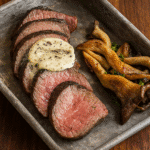
Teres Major Steak: The best Cut You Need to Taste
- Total Time: 8hours 30minutes
- Yield: 4 1x
Description
Dry-brined teres major steak, infused with fresh herbs and cooked by pan roasting or grilling, is a flavorful, tender cut that every steak lover is sure to appreciate.
Ingredients
2 8oz Teres Major Steaks
kosher salt and pepper roughly 1 teaspoon of salt
1 tablespoon mixed herbs, such as rosemary, sage and thyme
2 teaspoons cooking oil
Instructions
Trim and Season:
Inspect the steaks for any silver skin or tough spots, then trim them away.
Season generously with salt, freshly ground black pepper, and a mix of your favorite herbs. Press the herbs into the meat, wrap in plastic, and refrigerate overnight to dry brine.
Pan-Sear or Grill:
Allow the steaks to sit at room temperature for about 20 to 30 minutes before cooking to help them cook more evenly.
For pan-searing, heat a cast iron skillet with a little oil. Sear the steaks until browned on both sides, and use tongs to brown the edges. You can finish in the oven if needed.
For grilling, wait until the coals are hot and the flames are gone. Grill the steaks slowly, turning to brown each side evenly.
Let It Rest:
When the steaks hit 130°F for medium-rare or 135°F for medium, transfer them to a paper towel-lined plate. Let them rest in a warm place for 15 minutes before slicing to keep the juices locked in.
Serve with Simple Sides:
Teres major pairs well with roasted vegetables, garlic mushrooms, chili-lime corn, sour cream mashed potatoes, or a lemony green salad.
Notes
Top with garlic herb butter, mushroom shallot butter, or a smoked paprika blend. Soften the butter, stir in your chosen flavorings, shape it into a log using parchment paper, chill until firm, then slice when you’re ready to use it.
- Prep Time: 5minutes
- Cook Time: 20minutes
- Category: Proteins
- Cuisine: American
Nutrition
- Serving Size: 4 servings
- Calories: 20kcal
- Sodium: 1mg
- Fat: 2g
- Saturated Fat: 0.2g
- Trans Fat: 0.01g
- Carbohydrates: 0.3g
- Fiber: 0.2g
- Protein: 0.1g
- Cholesterol: 0.3mg
Why Teres Major Steak Is the Chef’s Secret Weapon
Born from Necessity, Loved for Flavor
In busy kitchens, we learn to get creative with what we have. Cuts like teres major steak became favorites not because they were trendy, but because they delivered. When tenderloin prices went up, this cut quietly stepped in. It had the tenderness, it had the flavor, and most importantly, it never let us down on the plate.
It’s the kind of steak we used when we needed something special without the stress. It cooks evenly, holds moisture well, and always brings that clean, beefy bite that steak lovers crave.
It Handles Heat Like a Pro
What really makes this cut stand out is how it handles heat. You can sear it hot and fast, finish it in the oven, or throw it on the grill.Thanks to its compact, uniform shape, this cut cooks evenly and fast, giving you better control on the grill with fewer flare-ups and less guesswork.
Unlike fattier cuts that often shrink or cause flare-ups, teres major steak stays firm on the grill and holds onto its rich, beefy flavor. It doesn’t need heavy seasoning or complex sauces. A little salt, maybe some garlic or fresh herbs, and you’re set.
This is the steak you cook when you want the results of a high-end cut without the cost or stress. And that’s exactly why so many chefs keep it close.
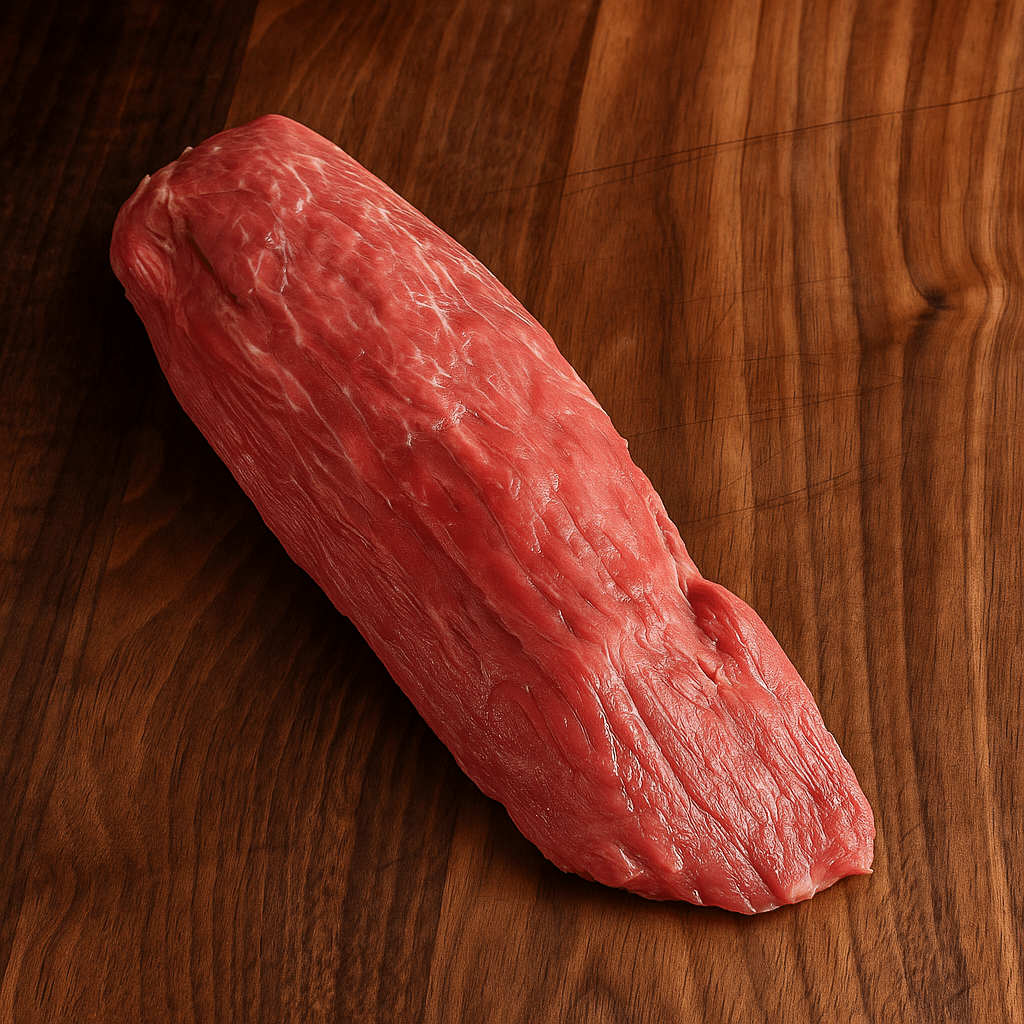
Teres Major Steak Benefits and Flavor Profile
Tenderness Without the Fuss
Teres major steak is surprisingly tender for a cut that comes from the shoulder. Most folks expect toughness from that area, but this one breaks the rule. It’s often called the second or third most tender cut on the cow, right behind tenderloin and ribeye.
The best part? It doesn’t need marinating or pounding. A simple dry brine and proper resting bring out its natural texture. That means you’ll spend less time prepping and more time savoring every bite of your meal.
Deep, Rich Beef Flavor
While tenderloin is known for texture, it can be a little mild in flavor. Teres major steak brings more to the table. It offers a pure, beef-forward flavor with a subtle touch of minerality that adds depth to every bite. That extra depth comes from the blood flow the muscle gets during the cow’s life. More circulation means more flavor.
When cooked right and rested long enough, you’ll get a juicy steak that slices easily and tastes like it came from a premium cut. You can serve it sliced over greens, paired with seasonal vegetables, or right off the cutting board with just a bit of sea salt.
This is the kind of flavor that doesn’t need a lot of help. Just a bit of care, a sharp knife, and an appetite.
For more recipes, follow me on Pinterest or Instagram
How to Prep Teres Major Steak Like a Pro
Get the Surface Clean
Before cooking, give your teres major steak a quick check. Some pieces come ready to go, but others might still have a thin, silvery membrane on the outside. That’s not something you want on your plate. Slide a sharp knife just under the edge of it and pull gently, keeping the blade tilted upward. You’re not carving, just cleaning.
You don’t need to trim away fat unless it’s thick or loose. This cut is naturally lean, so keep what little richness it has. The goal is to let the meat cook evenly and slice smoothly.
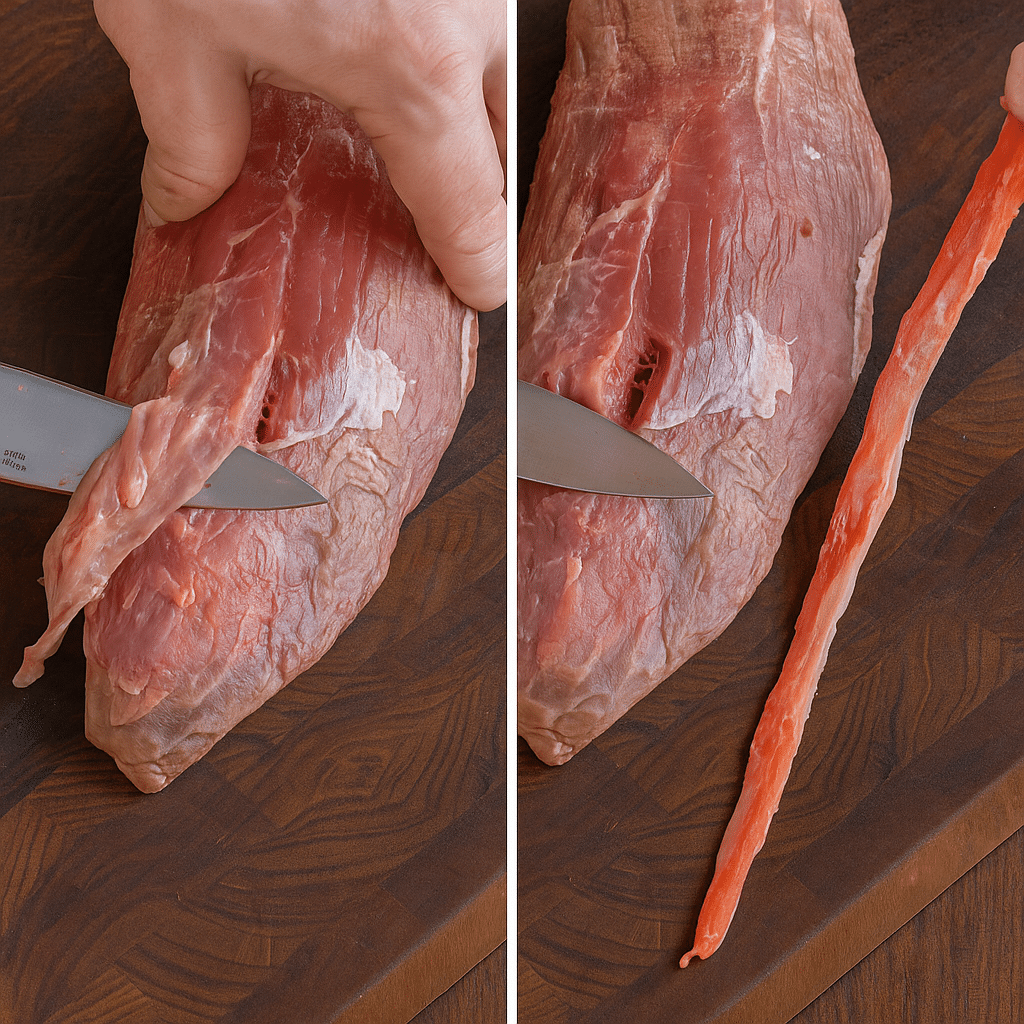
Salt It Early, Keep It Simple
A great steak doesn’t need much. Season your teres major steak with coarse salt and black pepper. That’s your foundation. If you like a little more depth, a pinch of fresh thyme or crushed rosemary will do the trick.
Now here’s the move that sets you up for success: give it time. Salt the steak ahead of time, at least a few hours, or overnight if you can. Keep it uncovered in the fridge. This firms up the surface and builds flavor from the inside out.
Before cooking, allow the steak to rest at room temperature for about 20 to 30 minutes so it cooks more evenly. Cold meat in a hot pan cooks unevenly, and you lose more juice when slicing. A rested, room-temp steak gives you control from the start.
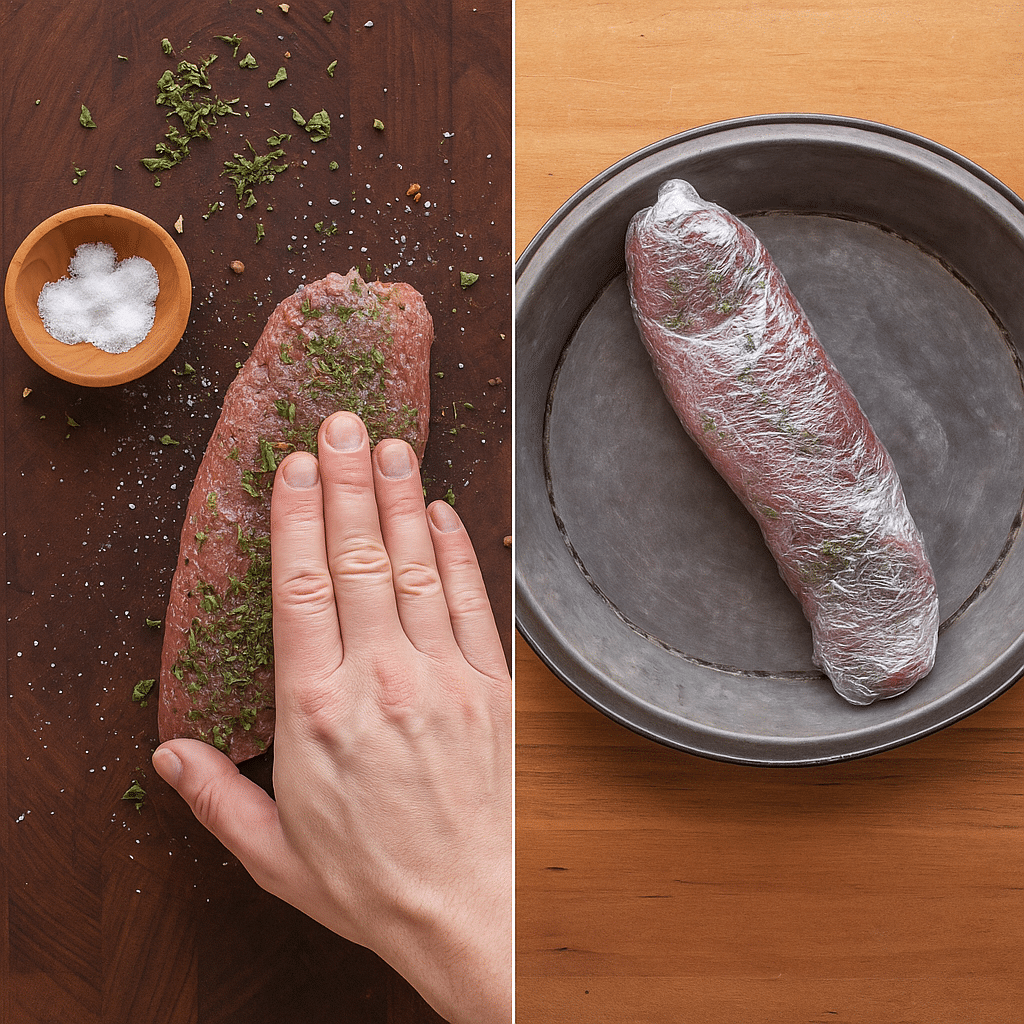
How to Cook Teres Major Steak (Step-by-Step)
Choose Your Heat: Pan or Grill
You’ve got options with teres major steak, and both deliver. If you’ve got a cast iron skillet, you’re in business. A grill works just as well, especially if you’re after a touch of smokiness.
For the pan, heat it up until it’s just shy of smoking. A bit of high-temp oil like grapeseed or avocado oil gives you a clean sear without burning. If you’re using a grill, get your coals or burners nice and hot. You want that strong, direct heat to start.
Sear, Flip, Finish
Place the steak down gently and let it sizzle. No need to press or poke. Let the heat do the work. Sear each side for about 2 to 3 minutes until you see a deep, even crust. Don’t forget the edges—use tongs to hold the steak upright for a few seconds on each side.
For medium rare, pull the steak when it hits 130°F in the center. Use a digital thermometer if you have one. If you prefer medium, go to 135°F. These temps give you a warm pink center without losing moisture.
Once it’s off the heat, don’t touch it right away. That’s where most people go wrong.
Rest with Intention
Let your teres major steak rest in a cozy, warm spot for 10 to 15 minutes to keep the juices inside and preserve its full flavor. Skip the cold plate and avoid covering it with foil, which traps steam. A turned-off oven or a spot near the stove works just right.
Why Rest?
Because teres major holds more natural juices than many other cuts. If you slice it too soon, those flavorful juices will run right out onto the cutting board. But if you wait just a bit, you’ll be rewarded with a steak that’s juicy, tender, and so soft it slices like butter.
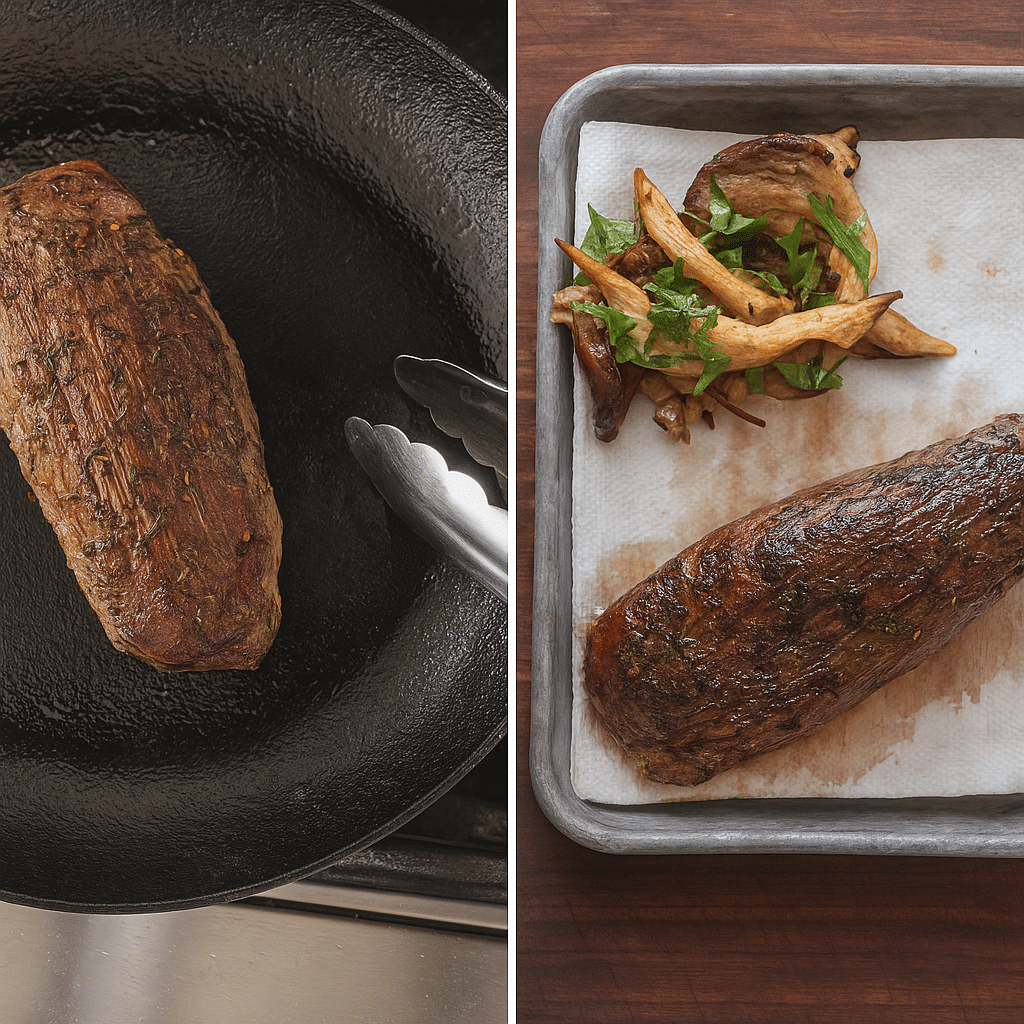
Slice Against the Grain
When you’re ready to serve, take a moment to find the grain in the meat, then slice against it. Use thin, steady cuts to keep each bite tender and satisfying. You can serve the steak whole or slice it ahead of time. Either way, it’s going to impress someone, even if that someone is just you.
For more beef ideas, check out instant pot corned beef
The Best Teres Major Steak Recipe (Full Walkthrough)
What You’ll Need
- 2 teres major steaks, 7 to 8 ounces each
- Kosher salt
- Fresh black pepper
- A small handful of chopped herbs like thyme or rosemary
- A bit of neutral oil such as avocado or canola
- Optional: butter for finishing
Step-by-Step Cooking
1. Light Trim
If the steak has any thin silver skin on the outside, use a small knife to clean it off. Keep it simple. Just tidy it up so the meat cooks evenly and slices clean.
2. Season
Sprinkle salt and pepper on both sides. Add herbs if you want a bit more aroma. Pat the seasoning in gently. Let the meat sit in the fridge for a few hours if you have time.
3. Bring to Room Temp
Take the steak out about 30 minutes before cooking. This allows the steak to cook more evenly throughout, from the edges all the way to the center.
4. Sear or Grill
Heat your cast iron pan over medium-high. Add a little oil. Once the pan is nice and hot, carefully lay the steak in to start searing. Let it sit for a couple of minutes. Flip it once and cook the second side. Sear the edges if needed.
5. Check Temperature
Use a meat thermometer. Remove the steak from the heat once it hits 130°F for medium-rare or 135°F for medium, based on how you like it cooked. It’s a small detail that gives you the exact doneness you want.
6. Rest and Slice
Set the steak on a warm plate and let it rest for 10 to 15 minutes. This allows the juices to spread back through the meat, giving you a steak that’s both tender and full of flavor. This keeps the juices inside. Then slice across the grain into even pieces. Serve right away.
Final Tip
This cut speaks for itself. With just a touch of seasoning and the right amount of heat, you unlock tenderness and bold, natural flavor. Keep things simple and let the steak speak for itself.
Top Side Dishes and Compound Butters to Serve With It
The Right Sides Make It Complete
Teres major steak brings bold, beefy flavor to the plate, so the best sides are the ones that balance that richness without taking over. Keep it fresh, keep it simple.
Here are a few favorites that always work well:
- Sautéed mushrooms with garlic and thyme
- Roasted vegetables, like carrots, asparagus, or brussels sprouts
- Grilled corn on the cob with a light chili-lime butter
- Creamy mashed potatoes finished with a spoonful of sour cream for a subtle, tangy kick.
- Light green salad with lemon vinaigrette for contrast
Each of these gives the steak some space while still making the plate feel complete.
Make It Shine with Compound Butter
A slice of flavored butter on top takes a great steak and makes it something special. It blends into the warm steak, bringing a touch of richness to each and every bite. Here are a few ideas that work beautifully with teres major:
- Garlic herb butter with parsley, thyme, and a touch of lemon zest
- Mushroom butter made with finely chopped sautéed mushrooms and shallots
- Smoked paprika butter with a hint of cayenne and salt
- Black pepper and rosemary butter for extra depth
To make one, just soften unsalted butter, stir in your mix-ins, shape it into a log using parchment paper, and chill until firm. Slice and place it right on the steak as soon as it’s sliced or while resting.
A Chef’s Suggestion
Don’t overthink it. A great side or butter doesn’t need to be complicated. Use what’s fresh and seasonal. Trust your instincts and cook what feels right next to the meat.
Teres Major Steak Nutrition and Portion Guide
Lean, Flavorful, and Satisfying
Teres major steak is a lean cut, but it doesn’t fall short on taste. That’s part of why I enjoy cooking with it, especially when I want something flavorful and easy to work with. You get a tender bite with a clean finish, without the heavy fat that comes with richer cuts like ribeye.
On average, a 4-ounce cooked serving gives you:
- Calories: About 180
- Protein: Around 24 grams
- Fat: Roughly 9 grams
- Saturated fat: Close to 3 grams
- Carbs: 0 grams
It’s a solid choice for anyone looking to enjoy steak without going overboard. The high protein makes it filling, and the fat is balanced enough to support the flavor without weighing you down.
How Much Should You Cook?
Most teres major steaks come in at about 7 to 8 ounces. That size works well for one generous portion or two modest servings. If you’re cooking for a group, plan on about 6 to 8 ounces per person depending on what else you’re serving.
You can also slice the steak into smaller medallions before cooking. This works well for sharing plates or when pairing with several sides.
Smart Cooking with Smart Portions
This cut is a great fit for a balanced meal. Pair it with vegetables and a light starch, and you’ve got a plate that’s both satisfying and well-rounded. It fills you up without feeling heavy, and that’s something I always look for when building a good dinner.
Where to Buy Teres Major Steak and How to Store It
Where to Get It
Teres major steak isn’t always front and center at the butcher counter, but it’s not hard to find if you know what to ask for. Look for a trusted local butcher. They may keep it in the back or need to cut it fresh, which is actually a good sign. This cut is sometimes called shoulder tender, so use that name if needed.
Some specialty meat markets and online suppliers offer it as well. The key is to buy from someone who handles whole cuts and knows their way around the shoulder section.
What to Look For
Pick steaks that are even in shape and firm to the touch. The color should be bright, not dull. A bit of surface fat is fine, but you’re looking for a clean, lean cut that will cook evenly.
Storing It Right
If you’re cooking within a day or two, keep the steak in the fridge. Place it on a tray with a light wrap over it. Letting a bit of air in helps keep the texture right. For longer storage, wrap it tightly in freezer paper or use a vacuum sealer. It freezes well and keeps its quality for a few months.
Always thaw in the fridge when you’re ready to cook. Don’t rush it. Letting it thaw slowly helps the steak hold its structure and flavor.
A Chef’s Tip
I like to keep a couple of these steaks on hand, especially in the freezer. They’re easy to pull out, quick to cook, and perfect for those nights when you want something that feels special but doesn’t take all night.
Teres major steak is one of those cuts that quietly delivers everything you want from a steak. It’s tender, flavorful, and easy to cook. If you’ve never tried teres major steak before, now’s the time to add it to your list. Whether you’re grilling, pan-searing, or slicing it into medallions, teres major steak adapts well to any method.
What makes teres major steak special is how it balances richness with a clean, lean bite. It’s affordable, reliable, and doesn’t need a lot of extras to shine. A good sear, a solid rest, and the right slice are all it takes to make teres major steak stand out.
For home cooks looking to step beyond the usual cuts, teres major steak is a great move. It cooks fast, takes seasoning beautifully, and pairs well with just about any side. If you keep a couple of these in the fridge or freezer, you’ll always have a reliable, restaurant-quality option ready to go.
So if you want a cut that’s flavorful, tender, and built for home kitchens, teres major steak is the answer. Simple, satisfying, and always worth it.
Conclusion
Teres major steak is one of those cuts that quietly delivers everything you want from a steak. It’s tender, flavorful, and easy to cook. If you’ve never tried teres major steak before, now’s the time to add it to your list. Whether you’re grilling, pan-searing, or slicing it into medallions, teres major steak adapts well to any method.
What makes teres major steak special is how it balances richness with a clean, lean bite. It’s affordable, reliable, and doesn’t need a lot of extras to shine. A good sear, a solid rest, and the right slice are all it takes to make teres major steak stand out.
For home cooks looking to step beyond the usual cuts, teres major steak is a great move. It cooks fast, takes seasoning beautifully, and pairs well with just about any side. If you keep a couple of these in the fridge or freezer, you’ll always have a reliable, restaurant-quality option ready to go.
FAQs About teres major steak
Is teres major a good cut of steak?
Yes, teres major steak is one of the best cuts many people have never tried. It’s incredibly tender, with a texture so soft it’s often compared to filet mignon. What sets it apart is its rich flavor and consistent texture. It cooks evenly, slices clean, and holds seasoning well, making it an excellent choice for both weeknight dinners and special occasions.
What is another name for teres major steak?
Teres major steak is also known by a few other names. You might hear it called shoulder tender, petite tender, or beef shoulder filet. All of these refer to the same muscle, which is located near the shoulder. Don’t confuse it with tenderloin—they’re different cuts, though they share a similar tenderness.
Why is teres major so cheap?
Teres major steak stays affordable because it’s not as well known as other premium cuts like ribeye or strip steak. It takes a skilled butcher to remove it properly from the shoulder, which is part of why it’s not as common in grocery stores. But this lower demand keeps the price down, giving you top-quality flavor without the high cost.
What is the best way to cook teres major?
The best approach to cooking teres major steak is to keep things simple, letting its natural flavor and tenderness shine through. Season with salt, pepper, and herbs, then sear it in a hot pan or grill it over direct heat. Cook it to medium rare or medium, then rest it for at least 10 to 15 minutes. Be sure to slice it against the grain to maintain its tenderness in every bite.
Do teres major steaks need to be trimmed?
Sometimes, yes. If the steak has a layer of silver skin, it should be removed before cooking. Most butcher-trimmed teres major steaks come nearly ready, but it’s always worth checking. Giving it a quick trim improves the texture and ensures the meat cooks more evenly from edge to center.
Is teres major steak tender?
Absolutely. Teres major steak is known as one of the most tender cuts of beef, coming just after the tenderloin in softness and texture. It has a fine grain and holds its shape during cooking. When cooked properly and rested, it’s juicy, soft, and packed with flavor.




